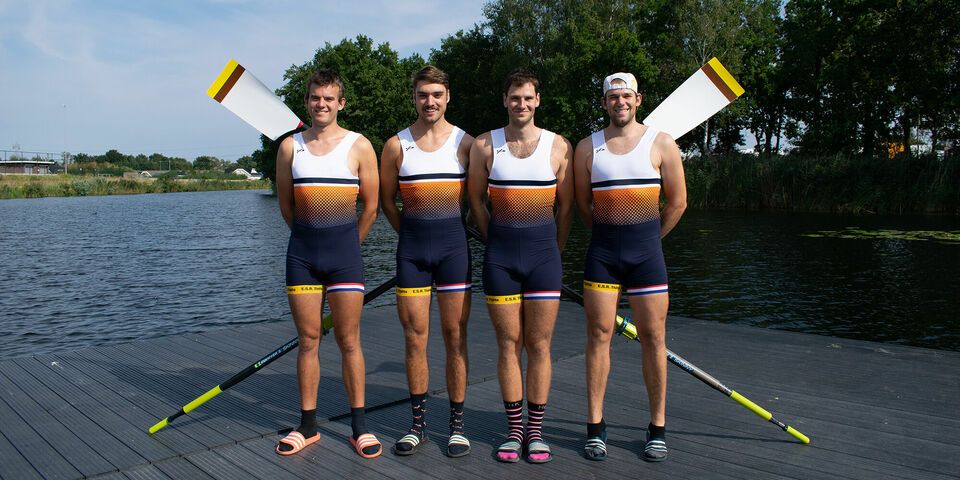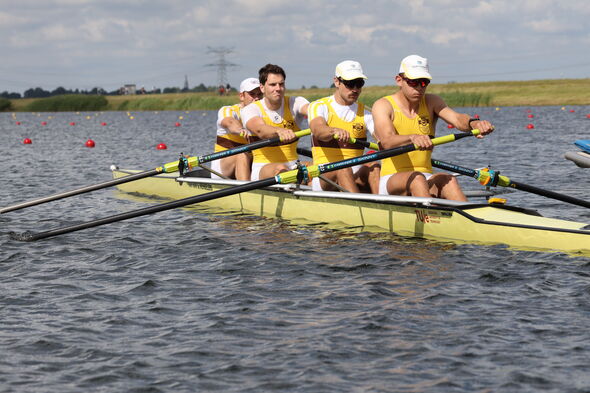Thêta at European Championship for universities in Istanbul
Thêta is going places. This Wednesday, for example, the student rowing association’s coxless four will compete at the European Universities Rowing Championships in Istanbul. The four TU/e rowers prepared for the tournament by following a regimen of eleven training sessions a week and large amounts of whole-grain bread, oatmeal, pasta, and fruit. Now all they need to do is cross their fingers and hope that Javier will hit his head on the boat truck, as this invariably brings good luck.
A coxless four is a team consisting of four rowers manning a boat without a coxswain. Kees Boerlage (far left in the main photo), who’s in the front of the boat – aka in the ‘stroke seat’ – is the one doing the steering. The 22-year-old TU/e student, who completed the bachelor’s program of Biomedical Engineering (BME) and is starting the pre-master of Applied Mathematics, also determines the stroke rate. Of course, being ‘in the front’ is a relative term, as rowers row backwards and Kees therefore crosses the finishing line last.
Applied Physics master’s student Youri Lemm (24, second from the left in the photo) is in seat 3, behind Kees. He delivers power and passes on the stroke rate to the others. In seat 2 we find Joost Boerrigter (23, second from the right), Mechanical Engineering master’s student. He gives commands, bringing together the four rowers’ efforts as effectively as possible.
Javier Bertrán Menz (24, far right in the photo), in the ‘bow seat’, brings up the rear. The AI & Engineering Systems (EE) master’s student safeguards the balance in the boat and keeps an eye on the water behind him: are there any obstacles and how are the other teams doing?
Boat truck
On Monday the four flew to Istanbul, where the European Universities Championship (EUC) will be held from Wednesday 7 thru Friday 9 September. When the tournament starts, the boats will have travelled for an entire week, as they left on the boat truck last Wednesday. “It is being driven down by members of the BotenWagen Compagnie, a special Thêta committee, who have licenses to drive vehicles that big,” Joost says.
Incidentally, the coxless four is not the only category in which Thêta will be represented in Istanbul: BME graduate Brian Poll (25) will be competing in the men's lightweight single scull.
The coxless four rowers find it difficult to say anything about their chances, as around thirteen countries are competing and there haven’t been any international matches in the past years due to COVID. Youri: “We have a decent idea of how good the Dutch teams are: we should be able to beat Delft, but our chances against Wageningen are fifty-fifty.”
“We’re aiming for the podium,” Joost says. Youri is more ambitious: “First place.” Javier concludes: “We’ll just do our best. It’s kind of fun not knowing where we stand.”
Ape index
As briefly alluded to above, the COVID pandemic made its mark on the rowers’ time at Thêta, all the more so because they’ve only been rowing for four years. And Kees has only been doing it for three. They tell us about having to train at home by themselves, on ergometers (rowing machines) they borrowed from the club.
They had to wait until this year to experience an entire race season (February-July). And it’s going well, says Youri. “We are winning more and more, and the tournament rowers’ results have a positive impact on the rest of the club.”
The advantage of rowing, Kees goes on, is that you can get really good in a short amount of time. “Soccer players who represent their countries often started out as six-year-olds. As a rower, you can make the national team within two years.” Youri: “A bit of talent and a lot of perseverance go a long way.”
So what does this ‘bit of talent’ entail? “Having long arms and legs,” Kees says while pointing at his limbs. Youri grins while spreading his arms: “Have you heard of the ape index? It means your arm span is greater than your height.” Joost explains: “That way you can make longer strokes.”
Oatmeal
It’s nice to be talented, but winning the EUC takes more than that. How did the coxless four prepare? “We ate a lot: whole-grain bread, oatmeal, pasta, fruit,” Kees lists. It’s no coincidence the men are big eaters, especially Youri: “If you share a meal with him, don’t put the pots on the table,” Joost says with a wink.
In addition, a great deal of training is required. Not three of four times a week, but an impressive eleven times. “We do weight training, ergometer training and boat training,” Javier says. The rowers take a day off once every two weeks or so, but they only party and drink beer a few times per year. Normally the Intro would be a good time for this, but the EUC takes priority.
When it comes to mascots, rituals and other lucky charms, the team is very clear: they don’t believe in any of that. And they don’t do any pre-race cheering either, Joost says. “There’s an American team called the Huskies, and when they start barking out their cheers, we’re like: get real.” Having said that, the coxless four do have one superstition: they’re hoping Javier will hit his head on the boat racks on the truck. “Every time that happens, we do well in the race,” he says.



Discussion